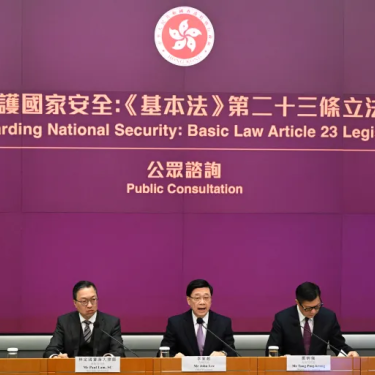Hong Kong: why journalists should fear “Article 23”, a domestic sequel of Beijing-imposed National Security Law

Hong Kong’s authorities are rushing the adoption of the “Article 23 bill”, a domestic extension of the draconian National Security Law imposed by Beijing four years ago, which since has been massively used against journalists and press freedom defenders.
After going over 212 pages of the draft bill in less than a week, and convening extra meetings over the weekend to speed up discussions, Hong Kong’s lawmakers just finished yesterday examining the Safeguarding National Security Bill, also referred to as “Article 23 bill”, which was unveiled by the territory’s government on 8 March 2024. The first reading of the bill took place only nine days after a month-long “public consultation” which was widely seen as a sham. The law is expected to be passed without opposition in a legislature dominated by Beijing loyalists following an electoral overhaul in July 2023.
The text, which Chief Executive John Lee insists should pass “at full speed”, is widely based on the draconian National Security Law (NSL) imposed by Beijing in 2020, which carries a life in prison sentence and has been massively used against journalists and press freedom defenders since its adoption. The new law introduces new crime categories, namely “espionage”, “external interference”, and “theft of state secrets'', which in the mainland are instrumentalised against press freedom defenders. In the colonial era law, the charge of “sedition” carried a maximum 2 years in prison, but with the new law the same crime will carry a ten-year term.
“By transposing the national security provisions imposed by Beijing into Hong Kong’s domestic laws, the government hopes to restore the illusion of a territory governed by the rule of law while carrying on its campaign against independent voices. We urge democracies to build up pressure on Chinese authorities so that full press freedom is restored in the territory.”
Like the National Security Law, the “Article 23 bill” is vaguely worded, paving the way to arbitrary application by judges, and may apply to acts committed outside Hong Kong’s borders. The future law introduces new crime categories, namely “espionage”, “external interference”, and “theft of state secrets'', which in the mainland are instrumentalised against press freedom defenders. In the colonial era law, the charge of “sedition” carried a maximum 2 years in prison, but with the new law the same crime will carry a ten-year term.
With this new text, possessing publications considered “seditious”, such as the independent newspaper Apple Daily, can become a crime punished by up to three years in jail. A suspect of a crime against national security can now be detained for 16 days without charges and can only access a lawyer after 48 hours. The simple fact of communicating with foreign organisations or diplomats could be considered as “foreign interference”, which carries a 14-year prison sentence.
The bill is named after Article 23 of the Basic Law, Hong Kong’s mini-constitution, which specifies that the territory should adopt its own national security law, but whose enactment was dropped following massive protests in 2003. In 2020, after another series of wide-scale protests, China imposed on Hong Kong with its version of a National Security Law (NSL), that was used to prosecute a number of journalists and press freedom defenders including Apple Daily founder Jimmy Lai.
Hong Kong ranks 140th out of 180 in RSF’s 2023 World Press Freedom Index, having plummeted from 18th place in the span of two decades. China itself ranks 179th out of 180 in the 2023 RSF World Press Freedom Index and is the world's largest jailer of journalists and press freedom defenders with at least 121 detained, including 12 in Hong Kong.
